Plastic Machining: Expert Insights on Delrin, PEEK, and Teflon/PTFE
Equipped with the latest advancements in CNC technology, modern manufacturing has a robust solution for producing high-precision components—machining plastic materials. Key roles are played by standout performers such as Delrin, PEEK, and Teflon/PTFE, each bringing a unique set of properties to the table. In this blog, we delve into the detailed benefits of plastic machining and how they compare to traditional metal manufacturing.
Understanding Precision Plastic Machining
CNC machining stands out as the preferred method for precision manufacturing. Unlike injection molding, CNC technology excels in creating highly accurate parts with complex geometries. Its extensive material compatibility makes CNC machining a versatile and universally accepted manufacturing practice, especially when dealing with various types of plastic materials.

Delrin: The Metal Substitute in Plastic Machining
Delrin, a homopolyacetal, is a polymer favored in CNC processes. Known for its metal-like strength and rigidity, Delrin boasts impressive tensile strength, durability, and resistance to wear, making it an ideal candidate for precision parts. Its natural lubricity reduces friction, facilitating the creation of components that operate smoothly without lubricants.
PEEK: The High-Performance Contender
Polyether ether ketone (PEEK) is highly regarded in high-demand applications. It sustains its performance under extreme temperatures, demonstrating remarkable strength and dimensional stability. Whether it’s in the form of granules, filaments, or rods, PEEK’s adaptability in machining processes is unparalleled, especially when considering its resistance to chemicals and ability to withstand continuous exposure to hot water or steam.


Teflon/PTFE: The Chemically Inert Maverick
Teflon, whose chemical composition is polytetrafluoroethylene (PTFE), is synonymous with chemical inertness and a super-low coefficient of friction, making it an excellent choice for non-stick surface applications. Its exceptional dielectric properties contribute to its widespread use in electrical insulation. Versatile in its application, Teflon’s machining process is crucial in creating parts that can consistently resist extreme conditions.
Machining Plastic Materials: Considerations to Keep in Mind
When planning for the machining of plastics such as Delrin, PEEK, and Teflon/PTFE, several factors must be considered:
⚪ Thermal Expansion: Managing the effects of heat during CNC machining to maintain form and functionality is imperative.
⚪ Strength and Hardness: Assessing these properties ensures the plastic can withstand the rigors of its intended use and influences the cutting processes for optimal results.
⚪ Moisture and Chemical Effects: Anticipating possible dimensional changes due to environmental factors is crucial for maintaining the accuracy of machined parts.
⚪ Aesthetics and Function: For components where appearance matters, the selection of materials and machining techniques should align with the desired finish.
Advantages and Drawbacks of Machining Delrin, PEEK, and Teflon
Machining Delrin offers inherent strength and machinability, making it the go-to for metal replacement. However, its susceptibility to strong acids and difficulty in bonding present limitations in particular applications. PEEK’s ability to perform at high temperatures and its biocompatibility make it a favorite for medical and aerospace sectors, notwithstanding the need for specialized handling to mitigate heat-induced stress.
Meanwhile, machining Teflon presents an array of benefits such as remarkable weather resistance and electrical insulation properties, though it poses challenges in maintaining tight tolerances due to its softness and substantial thermal expansion.
1. Delrin: Offers excellent machinability, strength, and moisture resistance but is less suitable for acidic environments and direct food contact.
2. PEEK: Provides supreme chemical resistance and operates well at high temperatures but requires careful handling to prevent stress cracking.
3. Teflon (PTFE): Exceptional for non-stick applications and chemical resistance but tricky to machine due to its softness and thermal expansion.
Critical Considerations for Choosing the Right Material
Here are strategic steps to guide you in making the right choice:
1. Thermal Expansion: Plastics expand more than metals under heat. Understanding a material’s response to heat during machining is key to maintaining precision.
2. Strength and Hardness: Material strength impacts chip formation and the final surface finish, whereas hardness affects tool wear. Delrin offers ease of machining with good mechanical strength, PEEK provides high strength and resistance at elevated temperatures, and Teflon’s softness demands careful tool choice to avoid deformation.
3. Moisture and Chemical Resistance: Some plastics may absorb moisture or react with chemicals, potentially altering their dimensions and stability. Delrin and PEEK provide good resistance to moisture and many chemicals, while Teflon offers unparalleled chemical resistance.
4. Aesthetic Requirements: For projects where appearance is crucial, such as in transparent pieces, the choice of plastic is critical to achieving the desired finish.
5. Functionality: The intended use of the machined part also determines the best material choice. Delrin is suitable for parts requiring low friction, PEEK for applications needing high strength at elevated temperatures, and Teflon where chemical resistance and low friction are paramount.
Conclusion
Choosing the right plastic material for machining involves balancing material properties with your project’s specific requirements. Delrin, PEEK, and Teflon (PTFE) each offer unique advantages, making them ideal for a range of applications in CNC machining. By considering factors such as thermal expansion, strength, moisture and chemical resistance, aesthetics, and functionality, you can select the most suitable material for your machining needs. Armed with this knowledge, you are well on your way to successfully navigating the world of machining plastic materials.
FAQs – CNC Machining Service Company in China
Q1: What are the main differences between Delrin, PEEK, and Teflon when it comes to CNC machining?
A1: Delrin is known for its high strength, rigidity, and ease of machining, making it ideal for parts requiring precision and durability. PEEK stands out for its high chemical resistance and ability to maintain properties at high temperatures, suitable for demanding environments. Teflon is renowned for its exceptional chemical resistance and low friction coefficient, perfect for parts needing non-stick properties. Each material requires different machining considerations such as tool selection and speed settings due to their distinct physical and thermal properties.
Q2: Can Delrin, PEEK, and Teflon be used for food-grade applications?
A2: Yes, all three materials have food-grade variants. However, it is essential to specify the food-grade requirement when ordering to ensure the material complies with the necessary safety standards, such as FDA regulations for food contact.
Q3: How do you manage the thermal expansion of these plastics during CNC machining?
A3: Managing thermal expansion involves carefully controlling machining temperatures through coolant application, adjusting machining parameters like feed rate and cutting speed, and allowing the material to acclimate to the operating environment before machining. Each material – Delrin, PEEK, and Teflon – has a different coefficient of thermal expansion, which should be considered during the machining process.
Q4: Are special tools required for machining Delrin, PEEK, and Teflon?
A4: While standard CNC machining tools can be used for these materials, tool material and geometry might need optimization. For example, sharp tools with high rake angles are generally better suited for machining soft and abrasive materials like Teflon. Conversely, tools with different coatings may extend tool life when machining abrasive materials like PEEK.
Q5: What are the major challenges when machining these plastic materials?
A5: Common challenges include controlling material deformation due to their lower stiffness compared to metals (especially for Teflon), managing heat buildup that can affect dimensional accuracy, and preventing burr formation. Each material may also have specific challenges, such as Delrin’s sensitivity to certain chemicals and PEEK’s requirement for post-machining annealing in some applications.
Learn more about plastic machining, visit https://fuyutechnology.com/plastic-cnc-machining/


